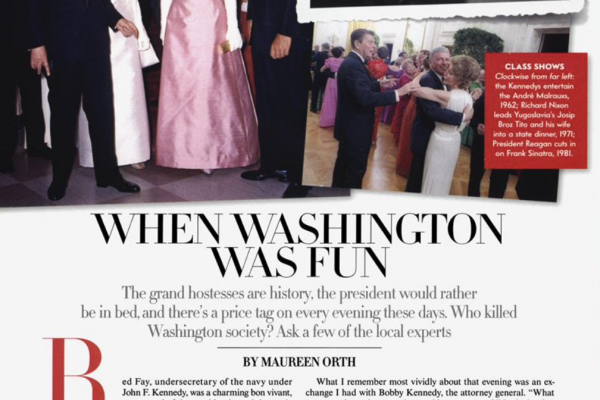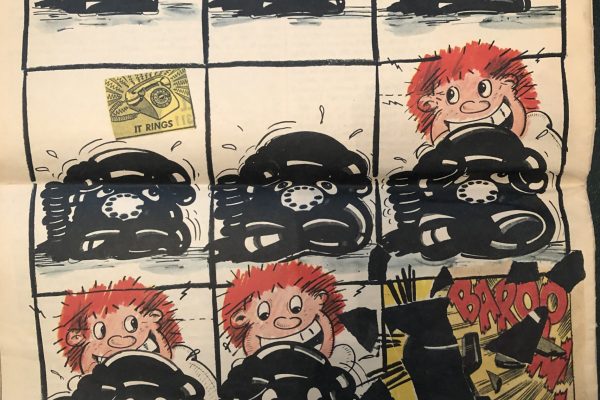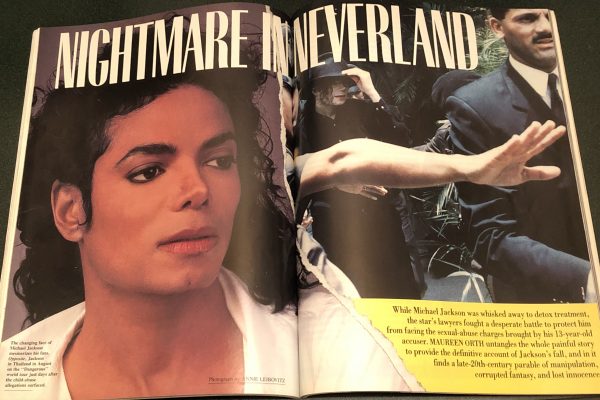Original Publication: New York Woman – October, 1989
They’re over. The Eighties. I heard their death rattle at the precise moment Chuck Berry hopped onstage in front of the Pooh-bahs present for the gala 100th anniversary dinner of The Wall Street Journal. Picture Chuck Berry at the Winter Garden of the World Financial Center, in bright red polyester bell-bottoms and matching stained glass-colored acetate shirt, duck walking for the country’s corporate and media elite. Chuck Berry performing for many of the go-go guys and gals who elevated greed to a religion. Well, roll over, Beethoven. He would have sat straight up to see Bianca Jagger there in her fashion-victim polka dots, trying to catch the beat by tentatively snapping her fingers. (I guess after Andy’s diaries, she’s decided to talk a walk on the safe side.”) Only Berry knows what he thought at the sight of the “suits” straining to boogie by hooking their thumbs on their cummberbunds and tapping their fingers ever so slightly on their paunches.
My life has been filled with symbols lately. I keep finding myself in situations that remind me of those mystico-Latino novels where dead birds drop out of the sky – like atop the Federal Reserve Building in Washington, D.C., watching the fireworks on the Fourth of July with the men who dictate fiscal policy for this country. “Tax man!” someone sang to budget director Richard Darman to the tuned of the Batman theme. “Never . . . not in 1989,” he shot back. Read his lips. Not in 1989, but what about 1990?
The prominent crowds who watched the fireworks spread in the sky between the tip of the Capitol on one side and the Jefferson and Lincoln memorials on the other was aglow and pleased with itself. Amid the rockets’ red glare, nobody seemed to notice the jarring, persistent wail of a car being broken into on the street below – the sound of the haves and the have nots marching even further away from each other. Drowned out, no doubt, by the din of political acrimony, the clamor over crack murders, abortion, flag amendments, corruption at HUD and contested corporate mergers. Indeed, has not the entire country – our values as well as our property – been put into play in the supply-side Eighties.
But isn’t it ironic that even as we have binged throughout the decade leaving social ills to fester, many of us nevertheless consider ourselves a species of victim too – no matter how priviledged? Living in New York, in particular, means subscribing to the victim dictum. You wake up and the armor goes on. I start to steel myself even as I contemplate coming to the city. Take the recent but not unusual day I came to New York for the Journal birthday bash.
We sit on the runway in Washington for an hour. “The weather patterns have been so weird lately. Do you think it’s global warming?” my seatmate queries. This particular shuttle is full of impatient movers and shakers snapping the papers shut, miffed that the plane’s phones don’t work. Suddenly the captain announces we’re pulling back to let someone off the plane. A very dressed-for-success female is having an anxiety attack. People are furious: How dare she pull a stunt like this? The captain announces there’s no cause for concern, her luggage was thoroughly X-rayed and so will stay on. Now we all shift uncomfortably in our seats. Thanks, captain. We arrive in New York two hours late.
Naturally it is impossible to get around Manhattan. The reason this time is that George Bush is in town to address the Journal dinner. Sirens wail, arms flail. On the same day that William Safire’s Times column charges that the presidency has become altogether too imperial, whole chunks of the city are off-limits. I go to a fancy salon for what will become, unbeknownst to me, my first hundred-dollar haircut. Fashion victim me. The stylist chatters on about having left his Lower East Side neighborhood because there were too many junkies and too much crime, only to move back because somehow he missed the violence, the danger. “I grew up so white-bread in California,” he explains. It’s gotten so some of us crave being victimized.
Stuck in traffic once again, I pull out a report I’ve waited months to receive. Interface, an educational-policy think tank, has prepared an exhaustive sixty-seven-page study on the effect of drugs on New York City’s children.
According to Interface, a stunning 26 percent of the half million twelve- to seventeen-year-olds in the city are drug abusers who need help in some form. They come from all economic classes, and they contribute a substantial amount to the estimated $7 billion a year that New York residents spend on drugs. By contrast, the city spends $14 million – spread among seven city agencies – in tax funds for prevention, education, and treatment. For every kid with a drug problem who is getting help, there are seventy who are not. But money’s not the only answer because, the report concludes, “city government as it is now structured can[not] effectively deliver substance-abuse services.”
In other words, an entire generation of youth is being lost. This should be front-page news in all the papers. It should be discussed in the mayor’s race, but I’ve just won a bet: It has yet to receive media consideration anywhere.
George Bush was going to address (in his way) that very issue at the dinner — kinder, gentler, those thousand points of light made up of individual voluntary efforts. As it turned out – surprise – I could have staked even money as to whether I would ever get there to hear him.
I learn that my husband has given up trying to get on a shuttle and is racing to the train station to somehow talk his way onto the Metroliner. I am to bring his tux in a cab and wait in front of Penn Station. He’ll change in the backseat. While I’m waiting, I see two drug deals go down. The driver has the radio on, blasting an ad for a Newsday series: “Are you hopeful about New York or not?”
My husband arrives breathless. “You look like a shorn poodle,” he tells me as we crawl down the West Side Highway. Finally all traffic comes to a complete halt. “The president is on the highway surface now,” a policeman explains. Our only choice is to get out and walk the last stretch. We proceed to slip past six different police lines on foot. “The way to kill a president,” cracks a bystander who’s watching us, “is to wear a tux.” Instead of laughing, I feel the threat of random violence hanging in the humid air.
Inside, the most obvious tribute to the Journal is that so many who have graced its pages in less that flattering poses have nevertheless shown up to page homage to its clout. I notice a distinct difference in the male elite’s first and second wives. The Firsts are older, of course, and decidely demure – for them the uninhibited Barbara Bush is a godsend. The Seconds are something else. I watch at my table as a First actually keeps her eyes downcast on her plate the entire dinner. Her CEO husband, meanwhile, is busy slinging boardroom banter with an ambitious Second married to a banking mogul thirty years older than she. A few of the Seconds who’ve been around a while now, and are perhaps wondering if they, too, will be eased out, are sporting electrocuted hair and poufed dresses. Instead of making them appear younger, this leaves them looking like Baby Snooks. Nevertheless, the best way to crash through the glass ceilings, it seems is to be the childless bride of a Titan.
Are they what feminism has fought for, I wonder? My dinner partner, a journalist who covers the White House, did not bring his wife and could barely eat, so upset was he that their nanny had taken off without warning, leaving this two-career couple with no child care. We talk about a phone conversation I had the day before with a leader of the Hollywood Women’s Political Committee, that group of forceful show biz women who seem poised to take over what passes for the women’s movement today. “Choice, choice, choice,” this woman had told me was the group’s priority, “then foreign policy and the environment.” “What about family issues?” I ask.
“Oh, we’ve got one domestic issue left, and we’ve got to decide whether to get behind the parental-leave bill or not.”
I almost lost it at that point, I was so angry and frustrated to realize how little she understood of the issues that can really move and mobilize the women whose support she so desperately needs. I wanted to ask – but didn’t – if she, or anyone else, honestly thinks that the enraged American Gothic face of Molly Yard, the president of NOW, screaming on TV every night is any match for the cool Brooke Shiels lookalike the Right-to-Lifers are offering?
I snap back to reality – of a sort. It is time for the president to speak. We all rise for “Hail to the Chief.” In his own Mr. Bumble manner, George Bush pleads with his audience to bring about a revolution in values, to turn away from the unbridled materialism that has guided us throughout the Eighties. (After all, he doesn’t want the government to have to foot the bill for Reaganomics.) “From now on,” Bush tells a dozen TV cameras and his audience of cutthroat businessmen, “any definition of a successful life must include serving others.”
I whisper to a network correspondent what a good sound bite for TV that statement is. The man looks at me as if I’m seriously deranged. “Oh, gag me with a Girl Scout,” he says.
Not long after, Chuck Berry begins to boogie.
This article is typed from the original material. Please excuse any errors that have escaped final proofreading.




No Comments